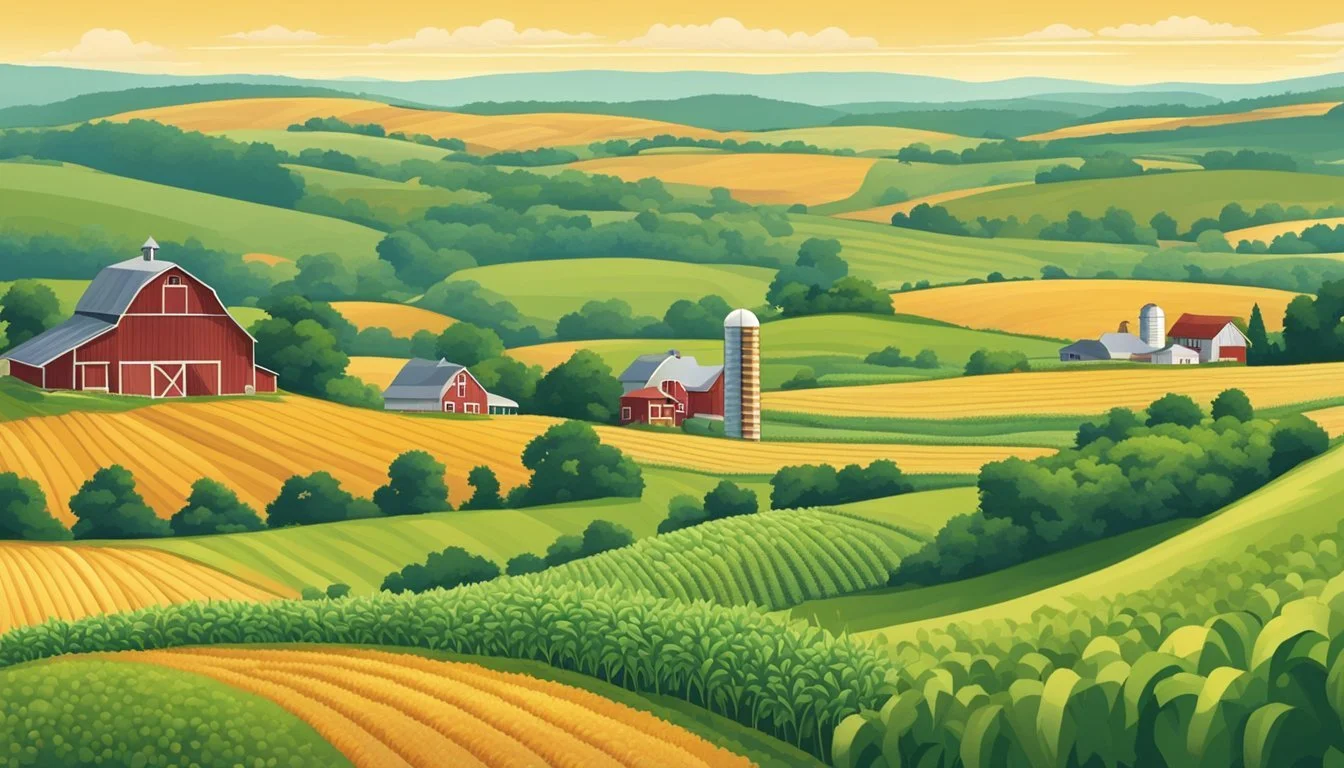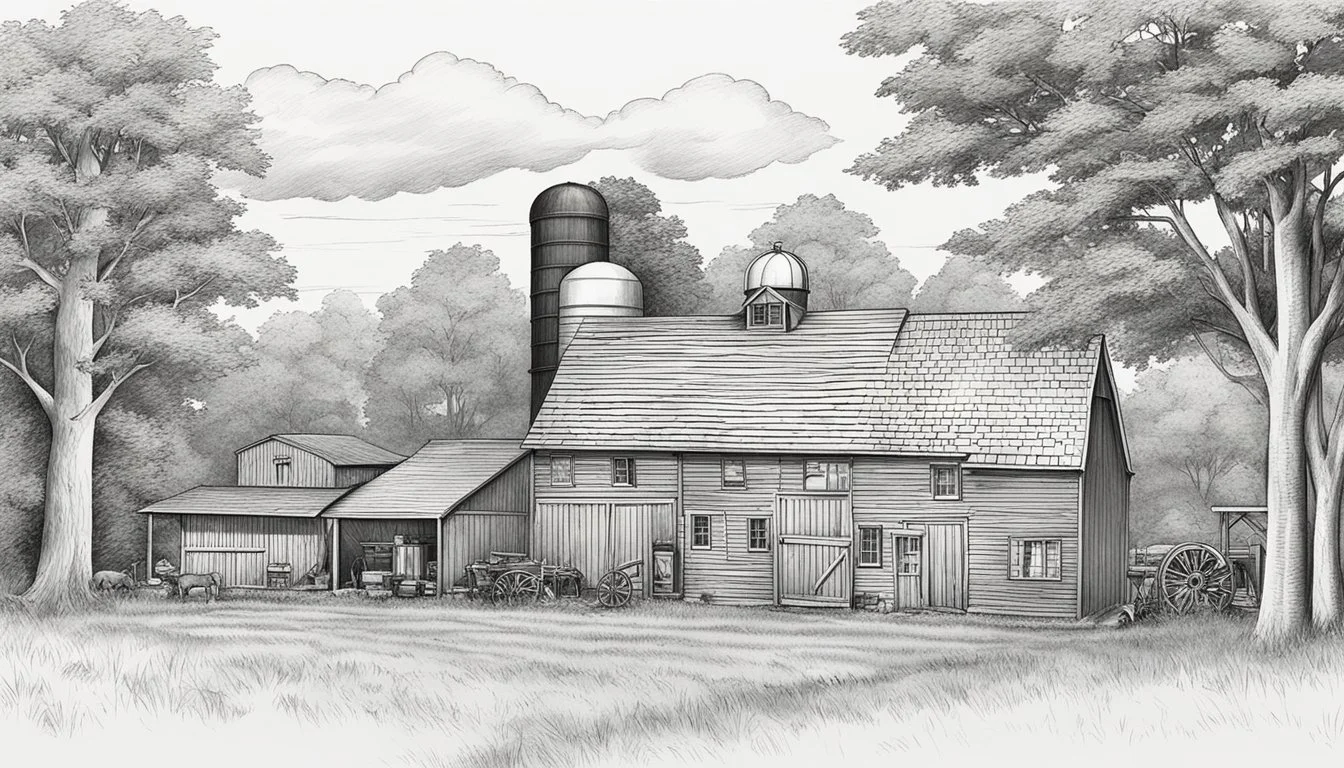Small Farms for Sale in Indiana
Your Guide to Buying Countryside Property
This Article is Part of State-by-State Guide to Buying Your First Small Farm
Indiana's rural landscape offers an appealing opportunity for prospective buyers seeking the tranquility of the countryside. Small farms dot the Hoosier State, providing a diverse array of properties that cater to a rich agricultural heritage. The market for these small farms stretches across the state, encompassing a variety of land types, from fertile plains suitable for cultivation to pastoral settings perfect for raising livestock or enjoying a quieter pace of life.
The real estate sphere in Indiana is accommodating for both first-time buyers and seasoned farm owners. Small farms for sale typically range in size, offering manageable acres for small-scale farming, hobby farming, or sustainable living. Property prices and specifications vary widely, ensuring that there's a farm to suit a wide range of budgets and farming interests.
Prospective buyers can find properties featuring ample acreage with ready-to-use infrastructures such as barns and farmhouses. Listings in the state often boast both modernized homes and land with significant potential for customization, allowing new owners to shape their Indiana farm to their specific needs and aspirations. The market is rich with investment opportunities, whether one's objectives are commercial farming, self-sufficiency, or merely an investment in a peaceful country retreat.
Understanding the Indiana Farmland Market
Indiana's farmland market offers a range of properties, with recent listings highlighting the availability of land varying in acreage and price across different counties.
Current Trends in Indiana Real Estate
The real estate market for farmland in Indiana is showing a diversity of offerings, from small acreages to larger plots. Data indicates properties range from 6 to 36 acres, catering to various farming scales and needs. In areas such as Lawrence, Harrison, and Floyd counties, properties are available with significant acreage, exemplified by recent sales listings:
Lawrence County: Properties up to 36 acres have been listed, with homes exceeding 3,000 sq ft.
Floyd County: Smaller farms around 6 acres come with sizable residential space.
Harrison County: Offers intermediate options like a 10-acre property featuring a large 6-bedroom home.
These listings suggest a robust market with options suitable for various buyers, whether looking for modest or more expansive farm operations.
Identifying Small Farm Opportunities
Prospective buyers seeking small farms in Southern Indiana can find several opportunities. Specifics indicate:
Acres: Farms are listed with as few as 4 acres to around 10 acres.
Residential Space: Accompanying living areas range from modest homes to more substantial houses with multiple bedrooms.
Price Range: Varying across regions, with more urbanized areas commanding higher per-acre prices.
Buyers should consider the local market dynamics, evaluating factors like proximity to urban centers which can influence land value. Rural areas a short distance from cities like Indianapolis or Fort Wayne can see higher per-acre costs, while more remote regions offer more affordable rates.
The listings hint at a vibrant market where one can find a range of farm sizes and price points, pointing to a diverse inventory for those interested in pursuing agriculture on a smaller scale in Indiana.
Types of Small Farms for Sale in Indiana
Indiana's diverse agricultural landscape offers a variety of small farms catered to different farming practices and lifestyles. These farms range in terms of acreage, existing infrastructure, and suitability for various types of livestock and agricultural activities.
Hobby Farms with Homes
Hobby Farms with Homes come with residential amenities and are often situated on 10 to 30 acres. They typically feature a house with sufficient living space, and buyers may find properties with a 2,648 square-foot home with 5 bedrooms in Washington County or a quaint 1,628 square-foot, 3-bedroom home in Orange County. These farms offer ample space for gardening, small-scale livestock, and recreational activities.
Rural Mini Farms
Rural Mini Farms are typically characterized by their size, ranging from 5 to 10 acres. Perfect for individuals looking for a smaller footprint, these farms can support a variety of activities, including small crop ventures or raising poultry. In Southern Indiana, listings, such as a 6-acre property in Floyd County with a 4,068 square-foot home, can cater to those seeking a rural lifestyle with the convenience of modern living spaces.
Country Farmettes
Country Farmettes serve as the middle ground between hobby farms and rural homesteads. These parcels may range from approximately 10 to 20 acres and are ideal for those who desire a bit more room for agricultural pursuits. Such properties may house various livestock like sheep and goats, offer space for organic farming, or provide an idyllic country living experience.
Acreage for Goats and Other Livestock
Properties with Acreage for Goats and Other Livestock are specifically suited for raising animals due to their ample pastureland and existing facilities like barns, fences, and shelters. These farms can be any size but typically have dedicated acreage that fosters the well-being of goats, sheep, and other farm animals, ensuring a suitable environment for their care and breeding.
Factors Influencing Purchase Price
When assessing the value of small farms for sale in Indiana, purchase price is generally influenced by property size and location, including the specific county in question.
Property Size Relevance
Property size is directly proportional to the purchase price of a farm. Smaller farms in Indiana may be more accessible for buyers due to their lower overall cost, while larger properties command higher prices due to the greater acreage. For instance:
A 6-acre farm in Floyd County may list for around $530,000, equating to approximately $88,333 per acre.
Larger farms, like a 36-acre property in Lawrence County, are advertised at higher prices such as $849,000, averaging about $23,583 per acre.
It's worth noting that while purchase price per acre may decrease as property size increases, larger parcels represent a more substantial overall investment.
Location and County Impact
The location of the farm within Indiana significantly affects the purchase price. Factors such as soil productivity, access, rainfall patterns, and proximity to markets, all vary by location and influence valuation. Here's a snapshot of how different counties can have diverse price points:
County Relevance in Pricing Hamilton County High land values due to soil quality and urban proximity Crawford County Lower prices with more rugged terrain Dearborn County Attractive for its river access and fertile soil Hendricks County Competitive prices, given suburban expansion
Counties like Huntington, Kosciusko, and Madison offer a range of prices reflecting agricultural potential and local demand. Whereas Vermillion and Spencer counties may present opportunities at different price points depending on the balance of cropland to non-cropland, such as woodland or pasture, which often is valued differently than cropland. Buyers should compare similar properties in counties like Jefferson, Jackson, Fulton, and Putnam to understand the typical purchase prices in those areas.
Finding the Ideal Small Farm
When seeking out the perfect small farm in Indiana, prospective buyers should focus on regions that best accommodate hobby farming, offer residential amenities, and present opportunities for outdoor activities such as hunting.
Review of Top Counties for Small Farms
Indiana boasts a variety of counties each presenting unique opportunities for small farm ownership. Here are some specific counties that stand out:
Hamilton County: Known for its accessibility and family-friendly communities, Hamilton County offers small farms that often come with homes suitable for those looking to balance farming with a suburban lifestyle.
Madison County: This county features a blend of agricultural and urban living, providing ample opportunity for hobby farms and potential for expansion.
Kosciusko County: Situated around the scenic lakes, Kosciusko County offers picturesque small farms perfect for those who appreciate water activities alongside agriculture.
Vermillion County: With its rolling hills and open landscapes, Vermillion County is ideal for those seeking rustic homesteads and the potential for hunting.
Huntington County: Farms here are often affordable, making it a compelling choice for first-time farm buyers.
Spencer County: This county is a hidden gem with farms that are perfect for both residential and recreational use.
Hendricks County: Offers a suburban-rural mix, with small farms that are close enough to Indianapolis for convenience but still offer a rural atmosphere.
Jefferson County: This area is known for historic charm and small farms that are perfect for those looking for a quieter, more laid-back lifestyle.
In the following table, additional relevant counties are highlighted:
County Notable for Crawford County Secluded properties and expansive outdoor pursuits Dearborn County Proximity to Cincinnati and rural vistas Putnam County College town amenities and fertile grounds for hobby farming Jackson County Diverse farming opportunities and strong community ties Fulton County Affordable prices and community-focused farming initiatives
Prospective buyers should consider these options when searching for a farm that aligns with their specific needs, whether it's for agricultural production, leisure, or simply a peaceful homestead.
Residential and Commercial Aspects of Small Farms
Small farms in Indiana serve various residential and commercial purposes, adapting to the needs and business models of their owners. On the residential side, these farms often feature comfortable homes that provide a rural lifestyle. For example, properties in Lawrence County may include houses with over 3,000 square feet of space, while options in Floyd County offer residences with sizes typically exceeding 4,000 square feet.
Commercially, small farms in Indiana can be robust, income-producing assets. They may focus on crop production, livestock, or specialties like organic produce. The diversity in land usage suggests a dynamic market, where properties might range from mere plots to full-scale operations, complete with essential farm infrastructure.
Key Aspects:
Residential: Homes on these farms are designed to offer the full spectrum of country living. They might feature amenities that cater to comfort and self-sufficiency, such as ample living spaces and well-maintained outbuildings.
Commercial: Farms may support various agricultural activities. For buyers interested in commercial farming, soil quality, water availability, and access to markets are critical factors.
Commercial Potential:
Crop Production: Arable land for crops like corn and soybeans, which are prevalent in Indiana's agricultural sector.
Livestock: Facilities suitable for animal husbandry, an essential revenue source for many small farms.
Specialties: Niche markets, such as organics or vineyards, often represent additional commercial opportunities.
Small farms in Indiana continue to represent a blend of residential appeal and commercial viability, offering diverse prospects for those interested in agriculture.
Closing the Deal
When purchasing a small farm in Indiana, the final step is crucial, involving detailed legal procedures and the handling of required paperwork to ensure a smooth transition of ownership.
Navigating Legalities and Paperwork
Purchase Agreement: Upon agreeing to the terms of sale, the buyer and seller must execute a purchase agreement. This legally binding document outlines the specifics of the sale, including the purchase price, property boundaries, and any contingencies.
Title Search: A title company will conduct a search to confirm the seller has a clear title to the property. This process verifies that there are no liens or encumbrances that could hinder the transfer of ownership.
Inspection and Appraisal: Although not always mandatory, a farm inspection and an appraisal can safeguard the buyer's investment. The inspection assesses the property's condition, including buildings and soil quality, while an appraisal determines its market value.
Closing Documents: A list of common documents to be signed at closing includes:
The deed
Bill of sale
Loan documents, if applicable
Seller's disclosure
Closing Costs: Both parties will encounter fees associated with the transaction. It is critical that the buyer has an accurate estimate of these expenses, which can include:
Inspection and appraisal fees
Title search and insurance
Attorney fees
Transfer taxes
Transfer of Ownership: Once all documents are signed and funds are exchanged, the ownership of the property officially transfers from the seller to the buyer, marking the conclusion of the purchasing process.





